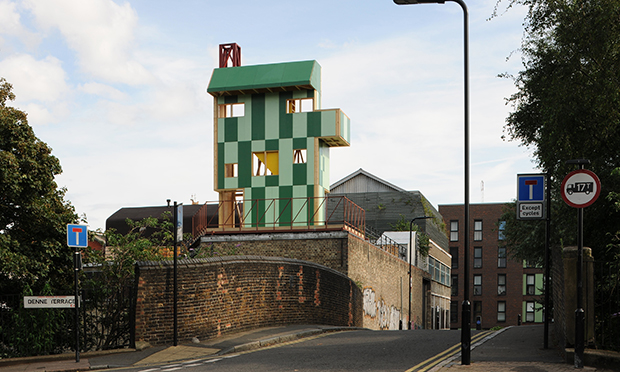Battle of the Potemkin: Town Hall seeks demolition of Hackney’s answer to Serpentine

Haggerston’s Antepavilion was singled out in June by the Observer as “challenging the supremacy” of the Serpentine’s annual architecture commission.
The site of a programme of open-air performance, it was even wished well by Hackney councillors when it successfully appeared to assuage residents’ concerns over noise, with Cllr James Peters hoping on granting a licence to the venue that it would bring “wonderful arts and culture to Haggerston”.
2019’s Antepavilion winner, Maich Swift Architects’ Potemkin Theatre, referenced 18th-century Russian military leader Grigoriy Potemkin, who was known to have constructed false villages in a bid to please Catherine the Great.
However, the Town Hall has proved not as easy to satisfy as the Russian empress, with local company Shiva, owners of Brunswick and Columbia Wharves on which the structure sits and sponsors of the Antepavilion competition, now fighting demolition notices from the council.
The Antepavilion competition is supported by the Architecture Foundation and received Arts Council funding, but Hackney Council has “disputed [the structures’] artistic merit”, saying their location is “unsuitable” and damages the look of the conservation area.
Wharves owner Russell Gray said: “Antepavilion expressly seeks to liberate the arts and architecture from institutional control. Hackney has consistently interacted with Shiva with animosity, which has been manifested in the form of repeated abuses of its powers in an oppressive and officious manner.
“The council has made a decision, allegedly at a very low managerial level, to challenge the merit of this structure, the positive contribution it makes to its environment and the public benefits it provides, on the basis of aesthetic damage to an architecturally entirely uninteresting, perfunctory and run down 1960s building.
“It is an extreme case of ham-fisted officialdom not recognising when to question its own uninformed opinions.”
The council argue that the Potemkin and three other rooftop structures, none of which have planning permission, do not “respect in any way the architectural historic quality and character of the surrounding conservation area”, calling them “alien” and “inappropriate”.
Gray has hit back at the council’s characterisation of the Potemkin as incongruous as “unconsidered and bizarre”, pointing out that visually it sits against the sweeping steel curves and “disparate volumetric forms” of the nearby Bridge Academy.
It is not the first time Gray has crossed swords with the council, which attempted to compulsorily purchase and demolish Brunswick Wharf in 2004, with plans to replace it with recreational facilities for the nearby school.
Maich Swift’s structure was built by volunteers over 25 days out of laminated-veneer timber frames, though Hackney’s enforcement notice dismisses their efforts as “not look[ing] sturdy or to be of high quality”, adding: “All the materials for the four structures appear to have been chosen to produce a particular look rather than to be of high quality or have any longevity.”
The Potemkin is the work of Maich Swift Architects. Paul Maich and Ted Swift formed their new practice after working for some years at London practice Caruso St John, particularly on Damien Hirst’s Newport Street Gallery.
They imagined the Potemkin as a cross-section of a theatre, as well as being inspired by the ramshackle house of Monsieur Hulot in Jacques Tati film Mon Oncle.
The enforcement notice adds that a “real problem with excessive noise radiating from the site” could exist, though Shiva is arguing in its appeal against the structure’s demolition that these concerns were settled in last year’s licensing hearing.
The Town Hall has said that it received a number of complaints around the time of the Potemkin’s licensing application, and that a previous appeal against previous enforcement action against rooftop development on the site was dismissed by the Planning Inspectorate.
While the Town Hall has a legal duty to investigate the complaints over unauthorised development it received around the time of the Potemkin’s licensing application, the complaints in and of themselves are not sufficient to justify formal enforcement action, according to the council.
On investigation, the council found the Potemkin, as well as three other architectural structures on the Wharves’ rooftops, to be “unacceptable in terms of their size, location and design”, as well as raising concerns over disturbing residents after dark.
Antepavilion is now moving ahead with its 2020 programme with a water level structure, and is seeking entries from architects that reference the “authoritarian governance of the built environment”.
Gray has also said that, if the Potemkin Theatre structure is allowed to remain, free daytime theatre and modern ballet performances will be offered to audiences on the canal’s towpath.
A Hackney Council spokesperson said: “The structures at Brunswick and Columbia Wharf were built in a conservation area without planning permission.
“While we are committed to working in support of high quality architecture, the Planning Inspectorate agreed with the Council and found that the structures cause harm to the character and appearance of the surrounding conservation area.
“This matter is currently subject to a legal enforcement process and follows a number of complaints received by the Council about the development which we must, by law, respond to.”
EDIT: This article was updated at 14:30 on Tuesday 14 January. The article initially said that a programme of events would be held on the canal towpath if the Potemkin structure was removed.
